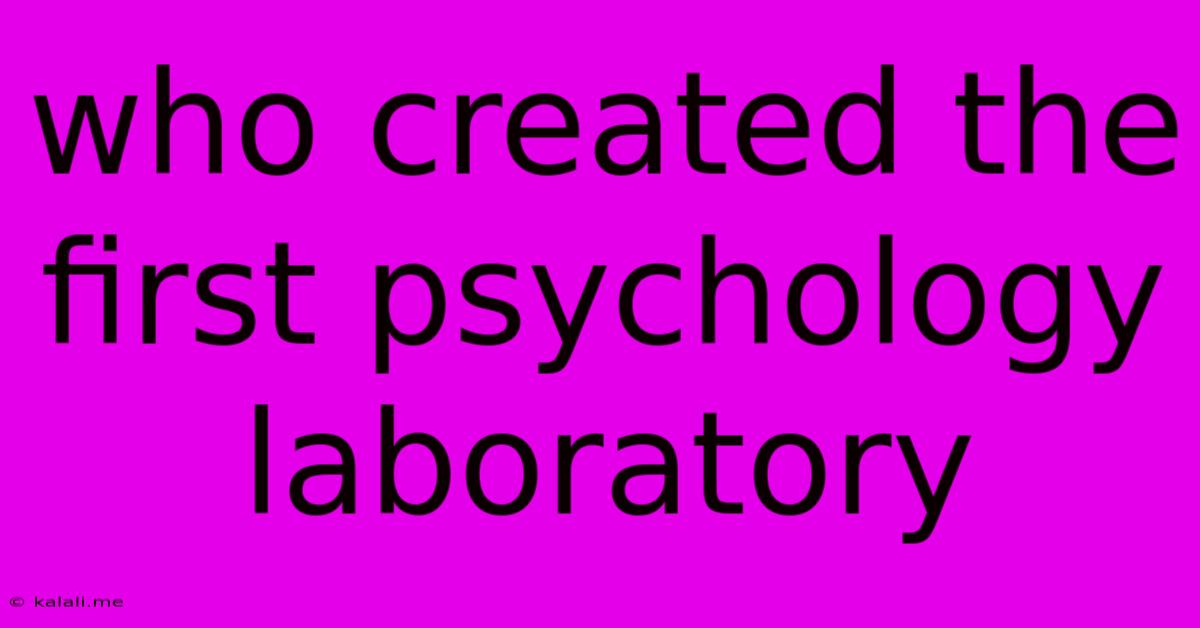Who Created The First Psychology Laboratory
Kalali
Jun 15, 2025 · 3 min read

Table of Contents
Who Created the First Psychology Laboratory? Wilhelm Wundt and the Dawn of Experimental Psychology
The establishment of the first psychology laboratory is a pivotal moment in the history of psychology, marking the shift from philosophy to a scientific discipline. While the philosophical roots of psychology stretch back centuries, it was Wilhelm Wundt who is credited with creating the first experimental psychology laboratory in Leipzig, Germany, in 1879. This event is widely considered the birth of psychology as an independent scientific field.
This article delves into Wundt's contribution, exploring the significance of his laboratory and its lasting impact on the development of modern psychology. We'll also touch upon the broader context of the time, highlighting the intellectual currents that paved the way for Wundt's groundbreaking work.
Wilhelm Wundt: The Father of Experimental Psychology
Wilhelm Wundt (1832-1920) was a German physician, physiologist, philosopher, and professor who dedicated his life to understanding the human mind. He wasn't the first to study mental processes, but he was the first to systematically apply scientific methods to the study of consciousness. His ambition was to establish psychology as a distinct scientific discipline separate from philosophy and physiology.
Wundt believed that consciousness could be broken down into its basic elements, much like a chemist analyzes a compound into its constituent parts. He used a technique called introspection, where trained participants carefully observed and reported their own thoughts and sensations in response to controlled stimuli. This method, although now considered limited, was crucial to Wundt's early experimental work. He meticulously documented these observations, hoping to discover the fundamental building blocks of human experience.
The Leipzig Laboratory: A Hub for Psychological Research
Wundt's laboratory wasn't just a simple room; it was a fully equipped research facility where students were trained in experimental methods. It was a center for pioneering research that attracted students from across the globe, many of whom went on to establish their own psychology laboratories and further disseminate Wundt's ideas. This dissemination played a crucial role in the rapid spread of experimental psychology across the world. The laboratory became a training ground for the first generation of experimental psychologists, fostering collaboration and contributing significantly to the development of various subfields within psychology.
The research conducted within the walls of Wundt's lab covered a wide range of topics, including:
- Sensation and perception: Investigating the relationship between physical stimuli and subjective experience.
- Reaction time: Measuring the speed of mental processes.
- Attention and memory: Studying the limits and capacities of human attention and memory.
- Language and thought: Exploring the connection between language and cognitive processes.
The Legacy of Wundt's Laboratory
While introspection as a sole methodology has limitations and has been superseded by more sophisticated techniques in modern psychology, the establishment of Wundt's laboratory was undeniably transformative. It provided a crucial framework for the development of experimental psychology, fostering the use of rigorous scientific methods and establishing the legitimacy of psychology as a distinct scientific discipline. His work laid the foundation for many subsequent schools of thought in psychology, including structuralism, functionalism, and behaviorism.
Wundt's impact extends far beyond the specific methods he employed. He established the importance of controlled experimentation, the collection of empirical data, and the development of theories based on evidence. These principles remain cornerstones of modern psychological research, making his contribution to the field immeasurable. The legacy of the first psychology laboratory lives on, serving as a constant reminder of the scientific foundation upon which the field of psychology has been built.
Latest Posts
Latest Posts
-
Difference Between Common Law And Statutory
Jun 16, 2025
-
Moment Of Inertia Of A Circle Formula
Jun 16, 2025
-
According To The First Law Of Thermodynamics Energy Can Be
Jun 16, 2025
-
Which Of The Following Statements Is True About Intranets
Jun 16, 2025
-
Ktet Category 3 Physical Science Question Paper
Jun 16, 2025
Related Post
Thank you for visiting our website which covers about Who Created The First Psychology Laboratory . We hope the information provided has been useful to you. Feel free to contact us if you have any questions or need further assistance. See you next time and don't miss to bookmark.